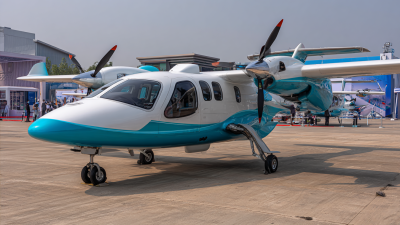Exploring the Advantages of Using General Aviation Fuel for Your Aircraft Operations
In the world of aviation, choosing the right type of fuel can significantly impact the efficiency, cost-effectiveness, and overall performance of aircraft operations. General aviation fuel, specifically designed for smaller aircraft, offers a multitude of advantages that can enhance both safety and operational flexibility. As pilots and operators navigate the complexities of flight planning and budget management, understanding the benefits of general aviation fuel becomes paramount. This fuel type not only provides a reliable energy source but also typically comes with lower costs and improved accessibility at various airfields. Moreover, its formulation often results in cleaner combustion, contributing to reduced environmental impact. By delving into the myriad benefits of utilizing general aviation fuel, this exploration aims to highlight why it stands out as a favorable choice for aircraft operations.

The Cost Benefits of General Aviation Fuel Compared to Jet Fuel
Using general aviation fuel can significantly reduce operational costs compared to traditional jet fuel. One of the primary advantages of general aviation fuel is its lower price per gallon, which can lead to substantial savings over time, especially for frequent flyers. Furthermore, general aviation fuel often has fewer taxes and fees associated with it, making it a more economical choice for aircraft operations. This financial benefit is especially appealing for smaller operators and private pilots who aim to maximize their budget without sacrificing performance.
Tips: Consider utilizing general aviation fuel for shorter flights and light aircraft operations. Also, regularly monitor fuel prices and trends in your area, as they can fluctuate and affect overall operational costs. Additionally, maintaining your aircraft for optimal fuel efficiency can amplify the financial benefits of using less expensive fuel options.
Another advantage of general aviation fuel is its compatibility with a variety of aircraft engines. Many smaller general aviation planes are specifically designed to run on this type of fuel, which allows operators to avoid the complexities that can arise from refueling with jet fuel. By choosing general aviation fuel, operators can enjoy a simpler fueling process without compromising on safety or performance.
Tips: Always confirm your aircraft's fuel compatibility before making the switch. Additionally, seek out airports with access to general aviation fuel to ensure a hassle-free refueling experience during your travels.
Understanding the Environmental Impact of Using General Aviation Fuel
The environmental impact of aviation fuels is increasingly drawing attention, particularly in light of the growing concern over non-CO2 emissions such as contrails and particulate matter. These emissions can significantly affect local air quality and contribute to climate change. Recent studies have aimed to clarify the implications of these emissions, as researchers and industry players explore sustainable alternatives that could mitigate these negative effects. For instance, the launch of the Swift 100R unleaded aviation fuel represents a pivotal move towards reducing aviation's carbon footprint, promoting eco-friendly flight operations without compromising performance.
Sustainable aviation fuel (SAF) emerges as a promising solution to lower emissions associated with traditional jet fuels. By utilizing cleaner alternatives, the aviation sector can address both operational efficiency and environmental sustainability. However, transitioning to these fuels presents challenges, including production scalability and economic feasibility. This ongoing exploration into different fuel types showcases the industry's commitment to balancing aviation's growth with environmental stewardship, aiming for a future with reduced climate impact while maintaining the capability to meet soaring global travel demands.
Exploring the Advantages of Using General Aviation Fuel for Your Aircraft Operations - Understanding the Environmental Impact of Using General Aviation Fuel
| Dimension | General Aviation Fuel (Avgas) | Jet Fuel (Jet-A) | Environmental Impact |
|---|---|---|---|
| Fuel Type | Avgas 100LL | Jet-A | Carbon Emissions Per Liter |
| Average Cost per Liter | $2.50 | $1.80 | Higher carbon footprint compared to Avgas |
| Typical Use Cases | General Aviation, Small Aircraft | Commercial Aviation, Jets | Less environmentally friendly for general use |
| Environmental Regulations | Stringent, evolving | Comparatively standard | Promotes sustainability initiatives |
| Availability | Widely available at airports | Available at major airports | Access to eco-friendly alternatives is increasing |
Operational Efficiency: How General Aviation Fuel Boosts Performance
General Aviation Fuel (GAF) plays a crucial role in enhancing the operational efficiency of aircraft operations. One of the primary advantages of using GAF is its optimized formulation for a variety of aviation engines. By ensuring that the fuel burns cleaner and more efficiently, GAF can lead to improved engine performance, allowing aircraft to gain more power per unit of fuel consumed. This enhanced efficiency not only results in lower operational costs but also contributes to reduced emissions, which is becoming increasingly important in today's environmentally conscious aviation industry.

Moreover, the use of General Aviation Fuel ensures that pilots can maximize their aircraft's range and speed. GAF’s unique characteristics allow for smoother operations under various weather conditions, reducing the likelihood of unexpected maintenance issues. This reliability means pilots can plan their missions with confidence, knowing that they have a fuel source that will support their aircraft's performance needs consistently. Consequently, the adoption of General Aviation Fuel not only elevates the performance of aircraft but also fosters a more sustainable and efficient approach to aviation operations.
Regulatory Considerations When Choosing General Aviation Fuel
When selecting general aviation fuel for aircraft operations, it is crucial to consider regulatory aspects that can influence both safety and compliance. The Federal Aviation Administration (FAA) and the Environmental Protection Agency (EPA) both set stringent guidelines regarding fuel specifications, especially in relation to emissions and air quality. According to a recent industry report, approximately 80% of general aviation flights operate with avgas, which is subject to these regulations. Ensuring adherence to these standards not only promotes environmental protection but also enhances flight safety.
Tips: Always stay updated on the latest regulatory changes that may affect your choice of fuel. Consult the FAA's latest publications and engage with local aviation authorities for insights into compliance requirements.

Furthermore, understanding the implications of fuel choices on flight operations is essential. For instance, using unleaded aviation fuel can potentially reduce lead emissions by up to 50%, aligning with the EPA's directive to lower pollutants. Operators should prioritize fuels that meet both performance needs and regulatory mandates to achieve efficient flight operations while being environmentally responsible.
Tips: Join industry forums and workshops to discuss best practices in fuel selection and regulatory compliance with peers and experts in the field.
Tips for Effective Fuel Management in General Aviation Operations
Effective fuel management is crucial for optimizing costs and enhancing the operational efficiency of general aviation. One primary tip is to implement a proactive fuel tracking system. By routinely monitoring fuel consumption and analyzing flight data, operators can identify trends in usage and make informed decisions on flight planning and fuel purchases. This data-driven approach allows for adjustments that can lead to significant savings over time.
Another important aspect of fuel management is the selection of the right fueling location. Choosing FBOs that offer competitive pricing and quality service is essential. Operators should establish relationships with reliable fuel suppliers to negotiate better rates, especially for bulk purchases. Additionally, being aware of fluctuating fuel prices at different locations enables operators to plan refueling stops strategically, further reducing overall fuel costs.
Lastly, regular maintenance of the aircraft can directly influence fuel efficiency. Ensuring that the aircraft is in optimal condition, including engine performance and aerodynamics, will minimize fuel consumption and enhance overall safety during operations. By incorporating these tips into their operation, general aviation users can maximize their fuel efficiency and lower operating costs effectively.
Exploring the Advantages of Using General Aviation Fuel for Your Aircraft Operations
Related Posts
-

Exploring the Future of Fuel System Aviation at the 138th Canton Fair 2025
-

Exploring the Future of Fuel System Aviation Innovations and Sustainability
-

Unlocking Efficiency: A Deep Dive into Fuel Flow Dynamics in Modern Engines
-

5 Best Solutions for Exceptional Aircraft Service Efficiency
-

Exploring the Future of Fuel Injection Aircraft: Innovations and Advancements in Aviation Technology
-

Fuel Injection Aircraft Innovations Showcased at the 138th Canton Fair 2025
